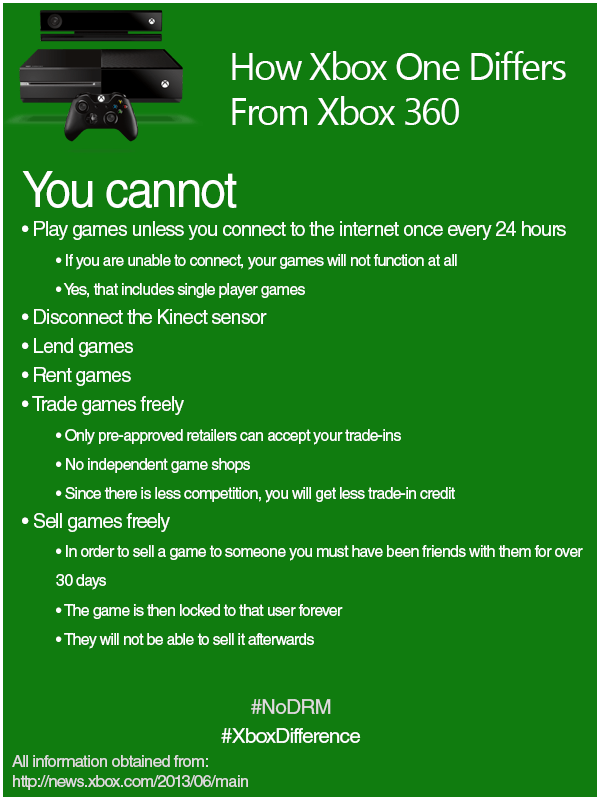Earlier today, Microsoft released a short and thankfully straightforward statement, addressing many of the questions resulting from the clumsy and vague handling that characterized their post–XBox One-announcement audience attitude. You can find several full texts with the full details here.
I’m often a fan of full disclosure. I find it refreshingly rare in a market ever more focused on aggressive marketing and hyperbolic 30-second explosions of sound and fury. And the clarity of Microsoft’s statements about several of the key features, requirements, and restrictions of the Xbox ONE certainly was refreshingly honest.
It’s just unfortunate that it’s not the kind of truth that console gamers want to hear.
The big bullet-points of today’s news are as follows:
1) The Xbox requires a connection once every twenty-four hours. Microsoft presents this as a means of keeping the console up-to-date, and optimized for your entertainment, but it really exists to keep their database of registered games current, and to minimize piracy and hacked consoles.
2) Games can traded and resold, but this is completely at the discretion of the publisher. Given publisher attitudes in the past, I wouldn’t count on it. Perhaps most upsetting, only “licensed” retailers can trade games. This trading system will have to interface directly with Microsoft, which likely means only the larger franchises will be in a position to provide this service.
3) Games cannot be rented or lent, but rather must be “given”. This can be gotten around via giving a game to a friend, but you must be friends with them for more than 30 days. In the meantime, your rights to the title are suspended. There is some conjecture that the list of 10 ‘Family’ members can cross consoles, and perhaps be a better solution for lending games.

4) A game can be directly sold from one Xbox ONE profile to another, but this will also require a 30-day period registered as friends. The account to which the game has been sold will have permanent ownership, and will not be able to resell that game.
5) The Kinect Sensor will be mandatory for the system to function. This may not seem alarming at first glance, but when coupled with the fact that Microsoft was the first major company to agree to the recently revealed PRISM data-mining operation by the federal government (exposed via the recent Verizon Wireless debacle) this minor point becomes perhaps the most damning.
I for one hope that this is the last bad news that Microsoft has for the console gamer market, and I’m sure their share-holders feel the same way.